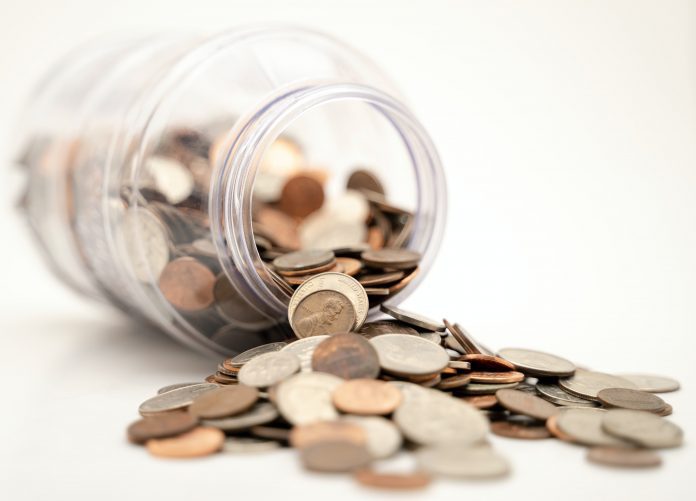I follow an Instagram account that often posts pictures of couples and individuals holding up signs telling how much debt they paid off and how long it took them. As I write this, the most recent posts include statements like: $42,072 in 11 months and $22,513.63 in 9 months.
$93,700 in 25 months.
$146,000 in 48 months
$40,000 in 12 months.
These statements are encouraging – kind of.
I’m genuinely proud of these people, but seeing their success is a little discouraging. My husband and I have been paying his student loans for almost a decade. And we are only a little more than halfway through paying them off.
I once hoped we could be the type of people to have paid off all his student loans in a short amount of time. But having four children, buying a car to hold all four children, experiencing an unexpected career change, going back to school for two years, buying our first home, and living through a pandemic have made it difficult to focus all our income on getting out of debt.
Sometimes it’s been all we could do to keep making the minimum monthly payments.
I want to write to those of you who are also staring at a mountain of student loan debt. I want you to know that you aren’t alone. As cool as it is to pay off a huge chunk of debt in a small amount of time, it’s also cool to slowly keep chipping away at the debt.
Often, getting out of debt just looks like making the monthly payment, month after month and year after year.
Here are some things I have learned from paying off student loan debt for the past decade. Maybe these will help you with your debt payoff journey. I’m not a professional financial planner, these are just my observations from helping pay off my husband’s student loans.
Limit How Much Student Loan Debt You Take Out. Both my husband and I have wished that we could go back in time and give his younger self some advice. We would have told him to not listen to the people in charge of his degree program. They made very exaggerated claims about what job prospects looked like after graduation. If you are considering taking out student loans, please talk to many people about what kind of income you can realistically expect after graduation and then take out loans accordingly.
Take a Cold Hard Look at the Amounts. When my husband first graduated from college he felt it was his responsibility to manage the student loans; they were his, after all. But several months into this process we realized that I should be more involved. (I have a degree in Economics and I managed all the other aspects of our budget.) I sat down and went through all the paperwork and got it organized. I entered the amounts into a spreadsheet. This was the first time either of us had really taken a long look at the loans. Yes, we’d known they existed and had a rough idea of the amounts, but seeing it all listed on a spreadsheet was an important step in knowing what we were dealing with. I wish I’d done it a lot sooner.
Use Forbearance and Deferment Sparingly – And Check the Details. There were times we had to put the student loans into Forbearance and Deferment. I’m glad those were options at the time, but they had some long term consequences that I wasn’t fully aware of. Some of the loans continued to accrue interest even though we didn’t have to make payments. Other loans used up all the allotted forbearance time. Years later, when my husband decided to go back to school, we didn’t have the option to put those loans into forbearance again.
Don’t Pay Off the Federal Loans Before Private Loans. When we first started getting serious about paying down the student loan debt, we were advised to pay off the loans with the smallest balance first. That way we could start some debt payment momentum. This is good advice; however, in our case, we shouldn’t have paid the loans with the smallest balance first. Those loans were Federal Loans and had much more favorable repayment terms. We should have been focusing on the large Private Loans that had higher interest rates and less favorable repayment terms. This past year, when payments and interest were suspended on Federal Loans, we were still stuck paying on the Private Loans.
Make Sure You Have Savings Before Paying Extra Money to Your Loans. When we began this journey, my instinct was to pay as much money as we could spare on the student loans each month. We had hardly anything in our savings account to cover emergencies and it led to some scary situations. Later, I set aside $1000 as an emergency fund and that was much better. Recently, I’ve started saving even more than that. For example, when we received our stimulus money back in the spring of 2020, I saved most of the money to cover our mortgage and other expenses in case my husband and I couldn’t work due to the pandemic. Yes, it would have been cool to apply that money to the balance on the student loans, but I felt so much more peace of mind by having it in the bank.
Refinance Your Private Loans. Interest rates have decreased quite a bit so if you have Private Loans, look into refinancing them. Last year I worked with my husband to refinance his private loans, and it’s one of the things I’m most proud of doing in 2020. The loans had been on a Graduated Repayment Plan which meant the monthly payment amount increased slightly each year. It was starting to edge up into an amount that was getting uncomfortable for our budget. I was able to refinance the loans to a set monthly payment as well as an interest rate that was 2.5% lower than what we had been playing.
Don’t Refinance Your Federal Loans. When we refinanced the Private Loans, I was tempted to refinance the Federal Loans along with them. I decided not to because Federal Loans have some favorable terms that would have disappeared if we’d combined them with the Private Loans. One month later, Federal Loans had their payments and interest suspended as part of COVID relief. There is also a lot of talk about the new Presidential Administration doing some sort of loan forgiveness for Federal Loans. If that does pan out, I’ll be glad I didn’t refinance the Federal Loans.
Save Tax Refund Money to Make Payments. I used to take our tax refund and pay off huge chunks of the student loans. This was back when I was still hoping to pay the loans off super fast. Our budget at the time made this possible. However, when my husband had to change careers and go back to school, I had to rethink how we used our tax refund money. We ended up setting aside most of our tax refund money in a special savings account. Then we would use that money to pay the monthly payments for his student loans.
Pay Down the Loan Principle When You Can. Even though it’s taken a lot longer to pay off my husband’s loans than we first thought, I’m still glad that we paid extra when we could. We were able to shrink the balance over the first 9 years to an amount that our mortgage underwriter felt was manageable. We could not have bought our house if we hadn’t paid down as much of the loan balance as we did over the years.
Don’t Forget Other Financial Priorities. I’ve learned that paying off the student loans can’t be our only financial priority. There are other things we need to focus on. For example, some debt repayment gurus suggest waiting to buy a home until you are completely out of debt. But when we did our most recent move, there really weren’t any rental homes that would have been less expensive than our monthly mortgage payment. We are a family of 6 and our children are getting bigger. Squishing into a small apartment just to save a couple of hundred dollars didn’t seem wise. So we bought a house. We are also realizing that things like life insurance should also be a priority.
No matter where you are on your debt payment journey, I want you to know that it is possible to get out of debt. Maybe you’ll be able to do it quickly. Maybe it will take you years. Maybe it will be slow sometimes and quickly at other times. Just keep exploring your options and doing your best.
And you better believe that when my husband’s loans are finally paid off, we are going to pose with a sign that says we paid off X amount of money in X years! It may not be super fast, but that doesn’t mean it won’t be a huge accomplishment.













Good insights! Our family is down to only the mortgage at this time, but we certainly faced some challenges to eliminate debts and properly manage credit accounts. Great insights from your progress. Several of your insights would be mutual observations from my journey.